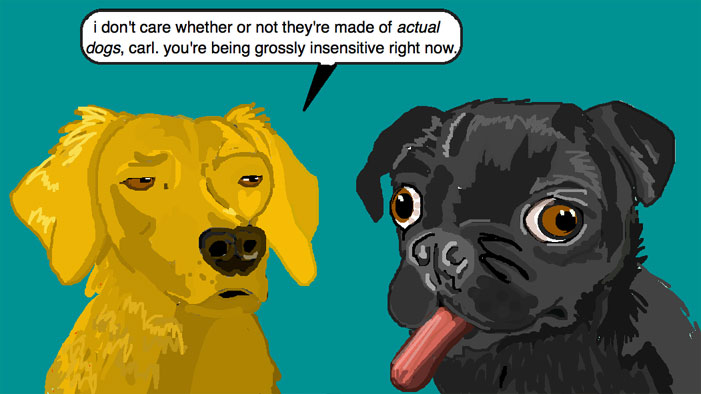Auntie SparkNotes: My Friends Won’t Stop Using an Offensive Term
 Dear Auntie,
Dear Auntie,
A while ago, I did something I normally don’t have the courage to do—I called someone out on a very offensive remark that was making a lot of people uncomfortable in the community. I explained why my friends and I were upset with this term, and for a couple hours it seemed like people were seeing my reasoning, but then someone asked why they themselves should stop using this term just because it didn’t upset them and was henceforth “not offensive.” Many people began to agree, and my opinion on the matter was lost and discarded.
Now I feel guilty for standing up for my friends. I really don’t believe that being told I was “overreacting” and “making a big deal out of nothing at all” was fair or just. I’ve been trying to privately explain these things to this group of people for over two months now, but I was always met with the same response: “I am not offended by this term and therefore it isn’t offensive.” I don’t believe this in the slightest, and several of my friends have already left the community because of the toxic attitudes. but I still can’t stop thinking… did I do the right thing by speaking up? Is my opinion simply not valid?
And unfortunately, Sparkler, the answer to that question is both yes and no.
Because alas, such is the nature of opinions: They’re not objective truths. That’s why even reasonable people can disagree on the inherent “offensiveness” of a word, an idea, a piece of art—as well as on less loaded subjects like whether chocolate is superior to vanilla or whether The Flash is a better show than Arrow. (Although obviously, anyone who prefers Arrow to The Flash is a tasteless monster who needs to be enrolled in an Orwellian reeducation camp until he learns to see reason.)
All of which is to say that I can’t tell you whether you were right to speak up or not. Not knowing what the term in question is, I couldn’t even tell you whether I personally agree that it’s a repulsive slur which shouldn’t be used in civilized company (or conversely, whether I’d be more inclined to agree with your friends that you’re making the proverbial mountain of the proverbial molehill.) All I can tell you is that you were perfectly entitled to ask your friends to change the way they talk around you, and to have that request treated with respect… which it actually sounds like it was, since you talked about this for hours and felt that your argument was being listened to and considered. That was fair.
But your friends were also entitled, after that conversation, to conclude that your request was onerous or unreasonable or flawed or whatever, and decline to comply with it. That, too, was fair.
Because, y’know, opinions.
Here’s where that leaves you: You know that your friends don’t share your feelings about the outrageousness of this particular term, whatever it might be. You also know that two months of “explaining” why your friends should feel differently have gotten you nowhere. What you’ve got here is a difference of perspective; they hear what you’re saying, but they don’t agree.
The only question now is whether you can live with that.
That part, of course, is completely up to you. You’ll have to decide whether the “offensive” status of this particular word is a hill worth dying on, or whether you can agree to disagree. All I can tell you is that you have some thinking to do—about this word in particular; about the squishy and evolving nature of language in general; and especially about that big, juicy, ambiguous gap between your friends’ intentions (not to offend) and your reaction (to take offense), because the real heart of your conflict is in there somewhere.
And that’s important, whether it ultimately changes the way you feel about the word, or the relationships, or both, or neither. Being willing to think, to ask difficult questions, and to unravel the root causes of your disagreements will always be your best hope of resolving them in a way that feels right to you—and sometimes, even if not this time, you’ll have the pleasure of discovering that while you and a friend might differ on the surface, you also fundamentally agree on all the big things that make a relationship worthwhile.
Got something to say? Tell us in the comments! And to get advice from Auntie, email her at advice@sparknotes.com.
Want more info about how this column works? Check out the Auntie SparkNotes FAQ.












